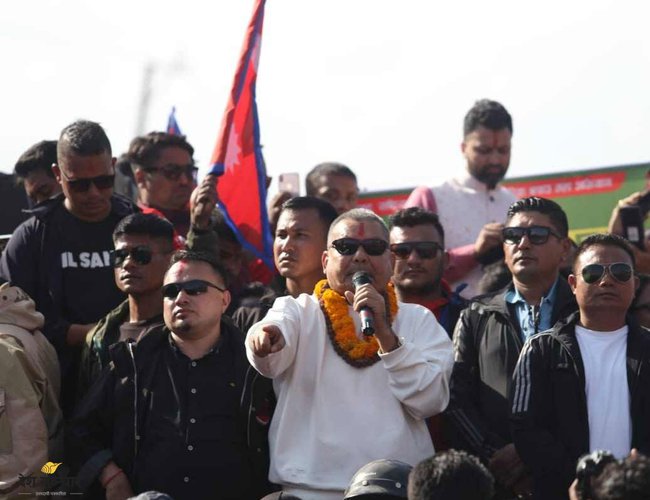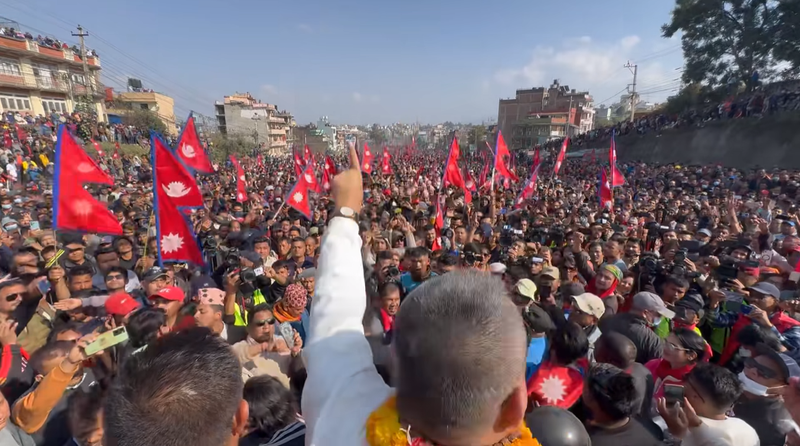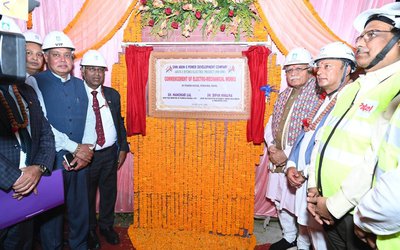
Although he was previously known only as a political activist, his recent actions appear to pose a significant threat to the current political dispensation and the political process. A year ago, Prasai began a political campaign. Five years prior, he played a significant role in unifying two communist parties and forming the UML under KP Sharma Oli's leadership. However, now he is challenging Oli and his party.
Prasai has launched an agitation to hold a referendum on the monarchy, federal system, and restoration of the Hindu State.
Given the country's political context, it is challenging to predict the outcome. Throughout past political changes, individuals like Prasai have emerged from the shadows to lead.
Prasai, a medical college owner from Jhapa, has initiated the movement demanding the abolition of the current constitution, restoration of the Hindu State, and holding a referendum for the monarchy.
His demands encompass providing relief to small farmers and medium entrepreneurs from loans granted by Cooperatives, commercial banks, and micro-finance companies. Likewise, he advocated for a decrease in interest rates.
Prasai initially engaged in politics via the CPN-UML, and subsequently joined the Maoist revolution during the insurgency. He previously maintained longstanding relationships with major political parties in the nation, which could explain why CPN-UML has mounted a direct political conflict against Prasai and his adherents.
Political Leaders
Although the country's major political parties have publicly ignored Prasai's demands, claiming there is no threat to republican, federalism, and secularism; the leaders of the major political parties, Prime Minister Pushpa Kamal Dahal Prachanda, NC Leader Sher Bahadur Deuba, and CPN-UML Leader KP Sharma Oli, recently held a meeting and agreed to unite in defending the current constitution.
Despite K.P. Sharma Oli's claim that Prasai is a hoax, the National Youth Federation Nepal, CPN-UML's sister organization, has announced a nationwide protest against Rastra, Rastriyata, Dharma-Sanskriti, and NagarikBachauAndolan, a citizen's movement advocating for the protection of nation, nationalism, religion, and culture.
CPN UML's sister organization previously staged a one-day demonstration of power on November 23. Led by Mahesh Basnet, CPN-UML-Durga Prasai has raised concerns of potential clashes with the government.
In order to prevent violent confrontations between Prasai's supporters and CPN-UML, the District Administration Office in Kathmandu has prohibited all demonstrations within the ring road.
Prasai And UML
Launched against the government, Prasai's movement is now turning into an anti-UML campaign. The movement is organized from the grassroots level and has support across all levels of society. Despite occasional divisions, CPN-UML's core cadre remains intact, and the party's organization is strong.
However, CPN-UML's leadership views Prasai's movement as a serious threat to its existence. After UML announced a rally against him, Prasai and his supporters are now openly waging war against CPN-UML.
Prasai maintains that he gave refuge to Maoists during the People's War, and once had a close relationship with former Prime Minister Pushpa Kamal Dahal. This is evidenced by Dahal's insistence, during his time as prime minister in 2016, on affiliating Prasai's medical college, B&C Hospital.
Prasai later became close to KP Sharma Oli once the UML and Maoists merged to form the Nepal Communist Party (NCP), and even joined the UML as a central member.
Oli became upset with Prasai's decision to conduct a campaign for the restoration of the monarchy, resulting in his expulsion from the UML in February.

Since then, Prasai has spoken unfavorably about Oli, which has been received negatively by UML leader Basnet.
On October 9 in Kathmandu, members of the UML youth wing smeared Prasai with black soot. This situation is ironic as Prasai previously stated the need to hold bankers and local sharks accountable, yet
he garnered public support by expressing his stance against loans, microfinance, and the plight of loan shark victims while simultaneously declaring his intention to showcase his power in Kathmandu starting on October 24. He presented programs with the goal of 'changing the system.'’
On November 19th, a statement was issued by Prasai's group announcing the commencement of the 'Peaceful Civil Liberation Movement' on November 23rd. Prasai has urged Hindu organizations, activists, and even Nepalis living overseas to join in the demonstration.
Sher Bahadur Deuba, President of the Nepali Congress (NC), has defended the republican system of governance in the country as the only viable option. Speaking to the media at Bhagalpur Airport in Chitwan district today, Deuba stated, "Objecting to the republican system is pointless, as it will not change."
When asked if the country's political parties were troubled by 'anti-republican activities', Deuba, a former Prime Minister, firmly replied, "Absolutely not."
However, when asked about the agreement on power sharing in the current coalition turn-by-turn, he did not provide a clear response. When asked about how power would be shared in the current coalition, the septuagenarian leader responded, "You will know for yourself."
NC leader Dr. Shashanka Koirala stated that he did not think monarchy would be reinstated, but acknowledged that citizens were dissatisfied with the government's performance, leading to questions regarding the current governance system.
He urged all political parties to unite in order to protect the republican system. "I am dissatisfied with the incumbent government's performance," he stated objectively. He noted the government's lack of attention to the country's progress and development, and questioned the
current federal structure. For clarity and understanding, he stressed the imminence of political parties uniting to alleviate citizens' doubts concerning the governance system.
At a time when the government is unable to fulfill their promises and growing economic hardship and corruption in provincial government are prevalent, there is increasing disenchantment among the people.
Prasai has gained a large number of supporters with his populist slogan, enough to challenge the present political system. Although political leaders have claimed that the current constitution has a solid foundation among the people and poses no immediate threat, Prasai's actions have demonstrated otherwise.
As before, Prasai's agitation has ended in failure. Currently, the political situation indicates an impending major crisis, and the outcome of Prasai's leadership in the agitation is uncertain.
- NEPAL-THAILAND: Joint Business Council
- Apr 13, 2025
- BIMSTEC SUMMIT: Nepal’s Stand
- Apr 11, 2025
- IME GROUP: Expands Into Paper Industry
- Mar 24, 2025
- CPN UML: Instigated By India
- Mar 23, 2025
- ADB’S CHIEF ECONOMIST: Nepal Reduces Poverty
- Mar 11, 2025















